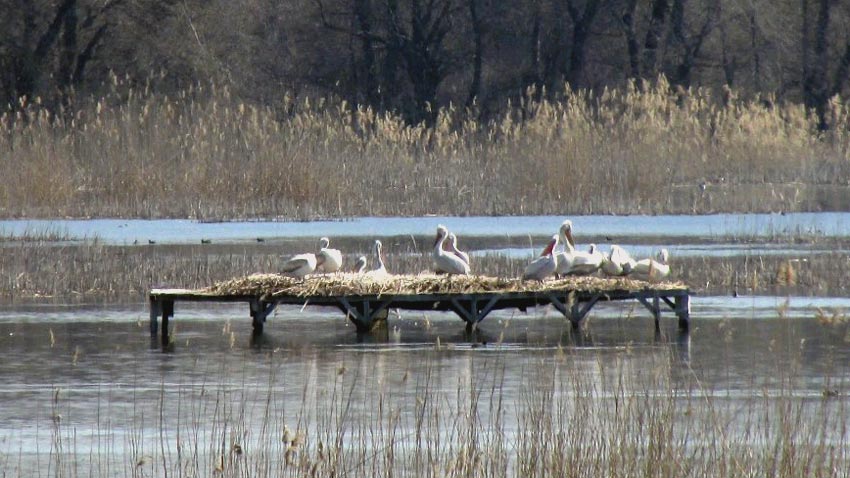The first pairs of Dalmatian pelicans which in March built their nests in the Srebarna Nature Reserve on the Danube River hatched a new generation. The pelicans were born in the wooden pile platforms specially built for them in the northern part of the wetland.
The protection of the Dalmatian Pelican colony is among the priority activities in Srebarna reserve. Under a project implemented by Regional Environment and Water Inspectorate, in the coming weeks it is planned to establish new places with suitable conditions for nesting more birds. This can be done by mowing the reeds and building new wooden platforms.

The biosphere reserve near the village of Srebarna is located 2 km south of the Danube River and is located right on the road of migratory birds from Europe to Africa - Via Pontica. Due to the rare and endangered species of birds, the wetland is included in the list of UNESCO World Natural and Cultural Heritage Sites.
221 species of birds nest in Srebarna. The reserve maintains 22 rare, vulnerable or endangered species of animals and plants according to the European Red List of Globally Endangered Animals and Plants, as well as 149 species of flora and fauna, which are included in the so-called Red Book of Bulgaria of endangered species. But the most valuable natural object in the reserve is the numerous colony of Dalmatian pelicans. Such colonies in the Old Continent exist only on the Balkan Peninsula.
An eco-trail with observation decks and gazebos for recreation has been built around the biosphere reserve, as well as a natural history museum, which presents the rich flora and fauna of Srebarna.
Compiled by Veneta Nikolova
English version Rositsa Petkova
Photos: bulgariatravel.org and archive
The 14th edition of DiVino.Taste, Bulgaria’s leading forum for wines and winemakers, will take place from 28 to 30 November at the Inter Expo Centre in Sofia. Over 80 producers from all wine regions will participate, offering tastings of around 600 of the..
Minutes before the second and final reading, at the parliamentary budget and finance committee, of the state budget for 2026, the leader of the biggest party represented in parliament GERB Boyko Borissov halted the procedure and sent the draft bill..
Despite being in Bulgaria’s poorest region, the North-West, Vratsa Province ranks among the top three in the country for economic development. According to 2023 data from the National Statistical Institute (NSI), it shares third place with Varna on the..
Minutes before the second and final reading, at the parliamentary budget and finance committee, of the state budget for 2026, the leader of the biggest..
The 14th edition of DiVino.Taste, Bulgaria’s leading forum for wines and winemakers, will take place from 28 to 30 November at the Inter Expo Centre in..

+359 2 9336 661
